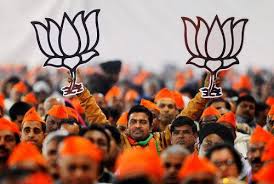Srinagar, Dec 24: The 2008 Jammu and Kashmir Assembly elections threw up a fractured mandate, resulting in a hung Assembly, with the Peoples Democratic Party (PDP) emerging as the single-largest party with 28 seats, and the Bharatiya Janata Party (BJP) delivering its best performance in the state, securing 25 of the 87 seats.
 No single party was able to win enough seats to form a government on its own.
No single party was able to win enough seats to form a government on its own.
The Mufti Mohammad Sayeed-led PDP, which had 21 members in the outgoing Assembly, gained seven seats this time, while the Omar Abdullah-led National conference (NC) was the biggest loser—its tally coming down to 15 from 28 in 2008.
The Congress, the ruling NC’s coalition partner, also suffered a setback, with its tally coming down from 17 in 2008 to 12.
The BJP, powered by Prime Minister Narendra Modi's ambitious campaign, more than doubled its tally of seats, with all gains coming from the Hindu-majority Jammu region. The party, which had 11 members in the outgoing Assembly, won 25 seats this time.
The Modi wave showed its impact on the Congress' performance in Jammu, where the deputy chief minister in the outgoing government and several of his cabinet colleagues lost to lesser-known BJP candidates.
While the Congress was decimated in Jammu, it gained in the Ladakh region, winning three of the four seats. It also won a handful of the five seats in the Kashmir Valley.
However, the Modi magic didn't appeal to voters in the 46 seats of the Muslim-majority Kashmir region and four seats in the Buddhist-dominated Ladakh region, where he had promised to usher in a new era of development if the BJP came to power. The party drew blank at both the places. The BJP had fielded 33 candidates in Kashmir, all of whom lost, and couldn’t even finish runner-up anywhere.
The biggest losses for the NC came in Srinagar city, where it lost five out of eight seats. The party had picked up all the seats in Srinagar in 2008. Outgoing chief minister Omar Abdullah, who ditched his traditional family bastion Ganderbal and contested from two other constituencies, was crushed in Sonawar (Srinagar) by the PDP’s Mohammad Ashraf Mir, and managed to win Beerwah (Budgam) by just a few hundred votes. The PDP’s chief ministerial candidate, Mufti Mohammad Sayeed, retained the Anantnag constituency.
What they said then...
The National Conference will be a serious player in whatever unveils in Jammu&Kashmir in the next few days.
Omar Abdullah
NC president and
outgoing CM
The option of forming the government, the option of supporting a government and the option of participating in a government are all open.
Amit Shah BJP president
In 2016, it will be Bhag Mamata Bhag (run).
Siddharth nath singh
BJP national secretary
One thing is clears that we will not go with BJP. As far as they (PDP and NC) are concerned, we have had alliances with them.
Ghulam nabi azad
Congress leader
In Jammu and Kashmir we have done reasonably well, though we have lost two-three seats from what we got in last elections. But that is an expected after such a massive drubbing in Lok Sabha polls.
Ajoy Kumar
Congress spokesperson
I honestly am very rebellious by nature. I would love to sit in opposition and be very constructive opposition.
Sajjad lone
Peoples’ Conference chief
In 2002, we had 16 seats. There was credibility crisis and people voted against National Conference. Today also, people voted against NC?and Congress.
Mehbooba Mufti PDP chief





Comments
Add new comment